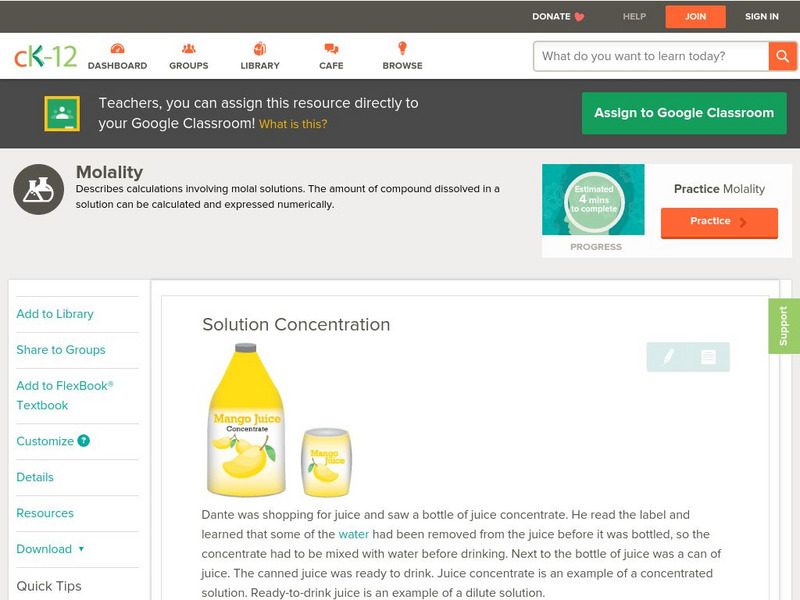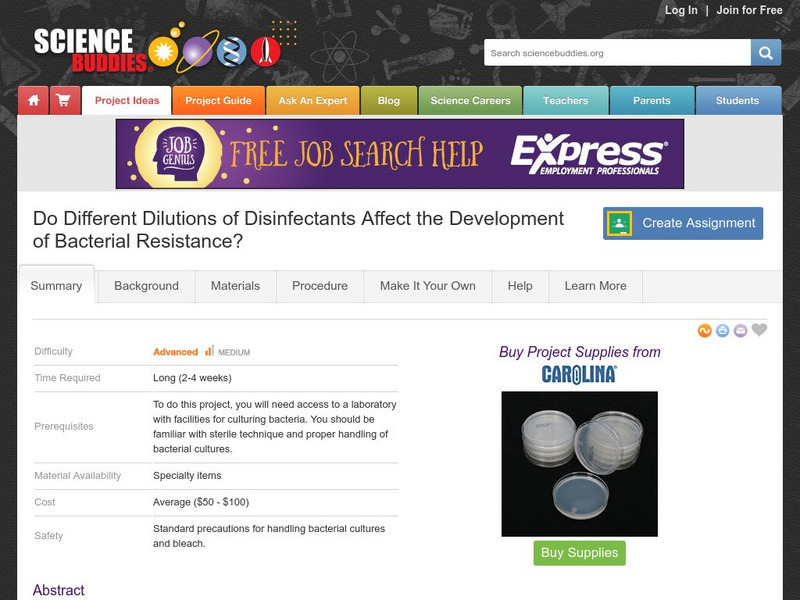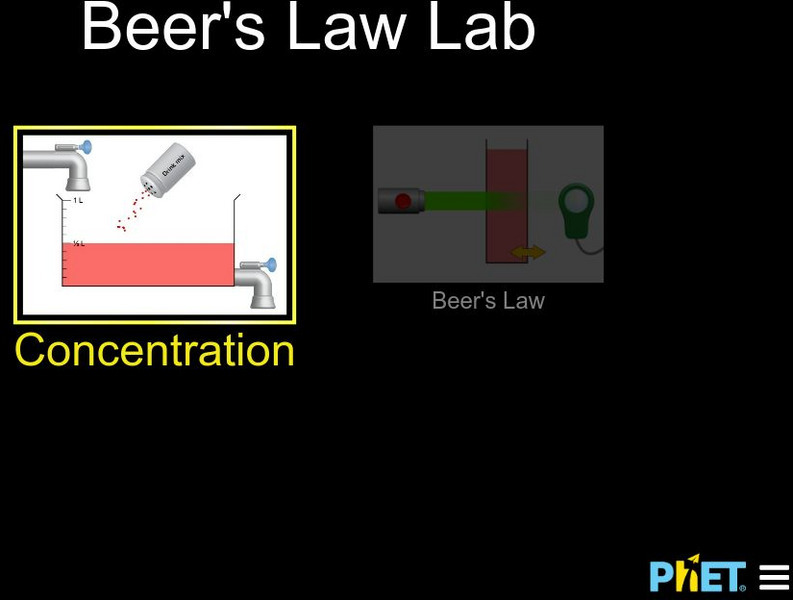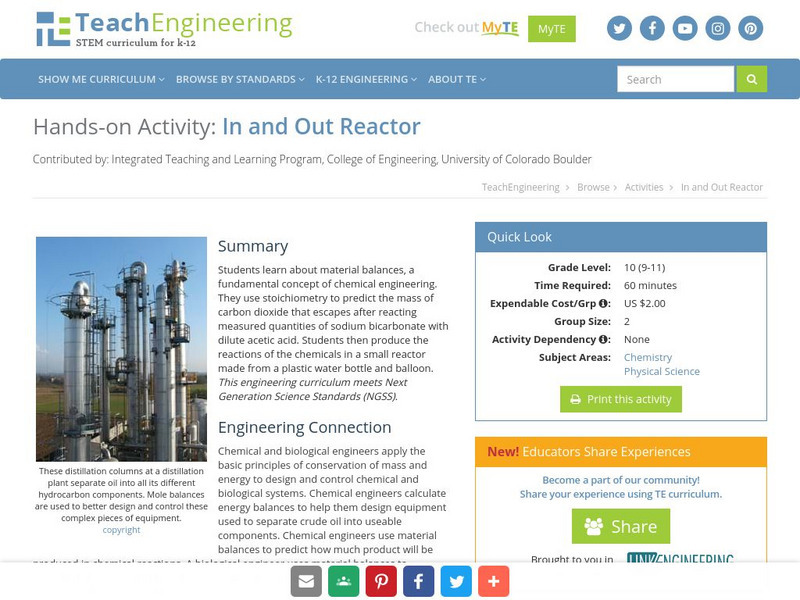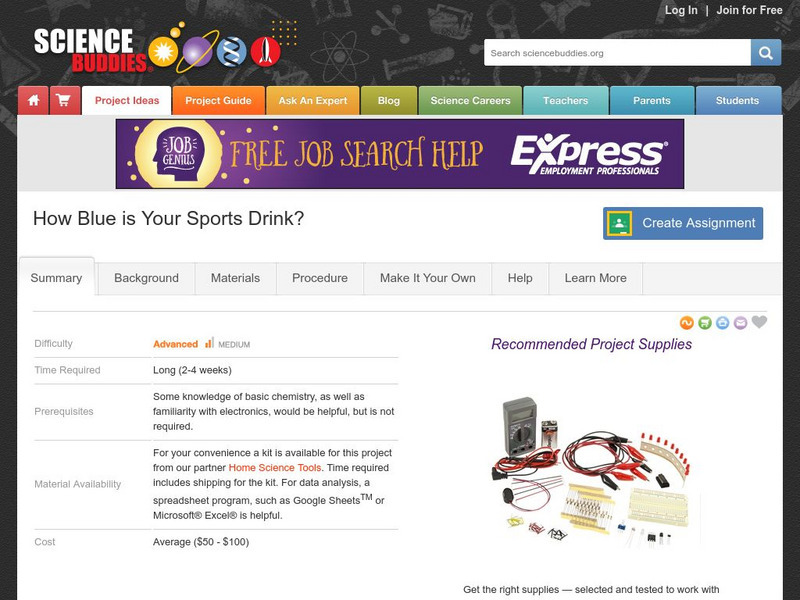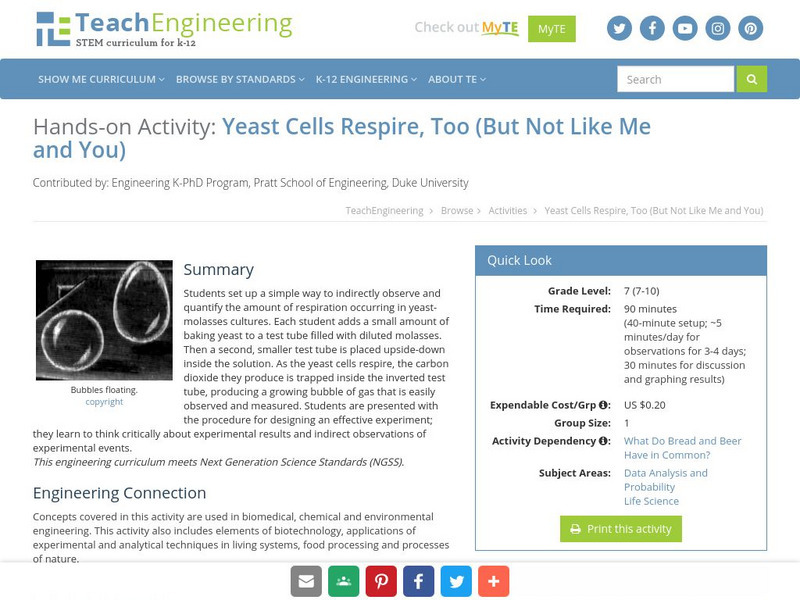Hi, what do you want to do?
CK-12 Foundation
Ck 12: Solution Concentration
[Free Registration/Login may be required to access all resource tools.] Students will calculate the concentration of solutions in units of molarity, and use molarity to calculate the dilutions of solutions.
Chemistry Collective
Chem Collective: Creating a Stock Solution
In this activity, students use the virtual lab to create dilute solutions from a concentrated stock solution of acids or bases. They must first calculate the correct volumes of concentrated acid solution and water to mix together to...
American Geosciences Institute
American Geosciences Institute: Earth Science Week: Global Change: Where Land, Air and Water Meet
To develop an understanding of parts per million as a concept, teams of students create successive dilutions of a solution to reach a parts-per-million concentration.
CK-12 Foundation
Ck 12: Physical Science: Solution Concentration
[Free Registration/Login may be required to access all resource tools.] Definition of concentration of a solution, the difference between concentrated and dilute solutions and how to calculate the concentration of a solution.
Science Buddies
Science Buddies: Do Dilutions of Disinfectants Affect Bacterial Resistance?
This is a project that illustrates the process of natural selection in action. You'll need access to a laboratory for working with the bacterial cultures used in this project.
National Institute of Standards and Technology (NIST)
Nist: Bose Einstein Condensation in Dilute Atomic Vapor
Gives a brief introduction to Bose-Einstein Condensation (BEC) and how it was demonstrated at a laboratory at the NIST.
Purdue University
Purdue University: Solutions
This site, which is provided for by the Purdue University, gives types of solutions, concentration, dilution, and titration.
University of Colorado
University of Colorado: Ph Et Interactive Simulations: Beer's Law Lab
"The thicker the glass, the darker the brew, the less the light that passes through." Make colorful concentrated and dilute solutions and explore how much light they absorb and transmit using a virtual spectrophotometer!
University of Colorado
University of Colorado: Ph Et Interactive Simulations: Basics
Test the pH of everyday liquids such as coffee, spit, and soap to determine whether each is acidic, basic, or neutral. Investigate how adding more of a liquid or diluting with water affects pH.
TeachEngineering
Teach Engineering: In and Out Reactor
Students learn about material balances, a fundamental concept of chemical engineering. They use stoichiometry to predict the mass of carbon dioxide that escapes after reacting measured quantities of sodium bicarbonate with dilute acetic...
City University of New York
Brooklyn College: Direct Microscopic Counts
Guidelines for an activity through which you, acting as a research assistant for a wine merchant, work to grow a microbe under different conditions.
Science Buddies
Science Buddies: How Blue Is Your Sports Drink?
Do you read the list of ingredients in foods and drinks before you buy them at the grocery store? If you do, you may have noticed that many of the items that are blue in color have the same dye, called FD&C blue 1. In this chemistry...
Howard Hughes Medical Institute
Hhmi: Biointeractive: Virtual Immunology Lab
This virtual laboratory demonstrates how an enzyme-linked immunosorbent assay (ELISA) is carried out and some of the key experimental problems that may be encountered. Students will learn about the assay procedure and the equipment and...
BBC
Bbc: Bitesize: Science: Acids and Bases
Resource serves as an introduction to acids, bases, and alkalis.
Khan Academy
Khan Academy: Bronsted Lowry Acid Base Theory
Understand the definition of Bronsted-Lowry acids and bases, strong and weak acids and bases, and how to identify conjugate acid-base pairs.
Texas Instruments
Texas Instruments: Investigating Acid Strength
This activity allows students a hands-on opportunity to discover why different acids with the same molar concentration have different pH and the opportunity to investigate the effects of acid dilution on pH.
TeachEngineering
Teach Engineering: Yeast Cells Respire, Too (But Not Like Me and You)
Students set up a simple way to indirectly observe and quantify the amount of respiration occurring in yeast-molasses cultures. Each student adds a small amount of baking yeast to a test tube filled with diluted molasses. A second,...
Illustrative Mathematics
Illustrative Mathematics: F Bf Summer Intern
For this task, young scholars write expressions that describe the relationship between quantities and ketch and analyze its graph. The task is about a worker at an aquarium who must dilute saltwater to a specified concentration of salt....
Other
Lawnix: Baker v. Carr Case Brief Summary
Charles Baker (P) was a resident of Shelby County, Tennessee. Baker filed suit against Joe Carr, the Secretary of State of Tennessee. Baker's complaint alleged that the Tennessee legislature had not redrawn its legislative districts...
Georgia State University
Georgia State University: Hyper Physics: The Inverse Square Law Problem
Illustrated examples of the Inverse Square Law with interactive opportunities to practice the problems.
Other
The Center for Voting & Democracy: The Voting Rights Act
The Center for Voting and Democracy offers a general overview of the Voting Rights Act of 1965. Content focuses on Section 2 and Section 5 of the Act, exploring their importance.
Other
The Concord Principles: An Agenda for a New Democracy
Read Ralph Nader's views on taking back power from self-serving institutions and the political system. This article written in 1992 sets forth ten arguments of how democracy has been abused and the means by which citizens can regain...
National High Magnetic Field Laboratory
Magnet Academy: Low Temperature Physics
Why do physicists want to study things at temperatures so cold atomic motion almost comes to a halt? And how do they create such frigid environments, anyway? Read on for the what, how and why of low temperature physics.
Nobel Media AB
The Nobel Prize: Jean Baptiste Perrin Nobel Lecture
At this site from The Nobel Foundation you can read Jean Baptiste Perrin's Nobel Lecture, "Discontinuous structure of matter," in which Perrin overviews the work which earned him the Nobel Prize in Physics.








